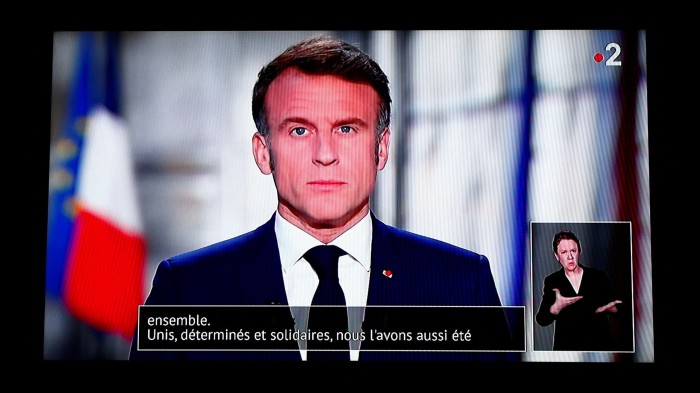Unlock the Editor’s Digest for free
Roula Khalaf, Editor of the FT, selects her favourite stories in this weekly newsletter.
French President Emmanuel Macron has said that he takes responsibility for the political divisions caused by his decision to hold snap parliamentary elections in the summer, saying the move had created “more instability than peace”.
“I have to recognise tonight that the dissolution has, for the moment, brought more divisions to the Assembly than solutions for French people,” he said in an annual new year’s address. “I fully acknowledge that.”
The address, Macron’s eighth as president, brings to a close a year in which his political influence has been significantly weakened by the dissolution in June, which empowered the far-right Rassemblement National and left France’s parliament divided into three blocs.
After a disappointing performance for his centrist candidates in European elections at the beginning of June, Macron surprised France by dissolving parliament, saying the country needed a “moment of clarification” to address the rise of the RN in European elections.
But the subsequent elections produced a decisive rejection of his centrist, pro-business agenda and made the RN France’s largest party in a fractured parliament.
Macron appointed conservative politician and former Brexit negotiator Michel Barnier as prime minister in September. However, he was toppled in a no-confidence motion last month after being unable to rally support from the left and far right for a budget designed to cut France’s deficit, which has ballooned to more than 6 per cent in 2024.
Macron has since appointed his ally François Bayrou as prime minister. Calling for politicians to compromise in 2025, he suggested that he might also ask French voters to cast ballots again in the year ahead.
“I will also ask you to decide on some key issues, because each of you will have a role to play,” he said in comments that several commentators said suggested potential referendums in 2025.
Macron also referred to foreign policy challenges for France next year.
Following the re-election of Donald Trump as US president, who has called for increased defence spending by Nato allies, Macron said, “Europe can no longer delegate its security and defence to other powers,” repeating his calls for more European defence spending.
He also called on Europe to “simplify its rules” to encourage more investment from business.
But the address is unlikely to change perceptions of Macron among voters. His popularity has sunk to a record low this year, with just 21 per cent of people having confidence in his ability to tackle France’s problems, in a poll by Elabe in December.
His far-right rival Marine Le Pen said in her own new year’s message on Tuesday that “belated regrets or perfunctory entreaties from a head of state who has been definitively discredited will not change anything”.
While she did not call overtly for Macron to hold early presidential elections before the next vote scheduled in 2027, Le Pen said 2025 would be a “decisive year”, adding that France could only solve its problems through a “democratic decision”.
Read the full article here




